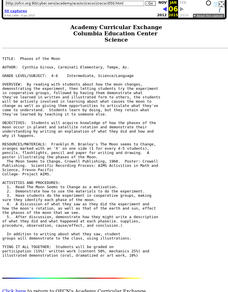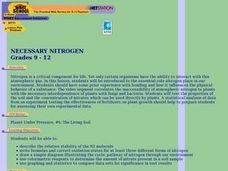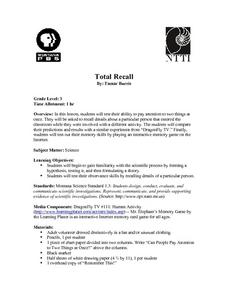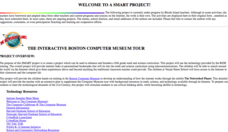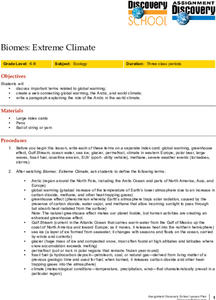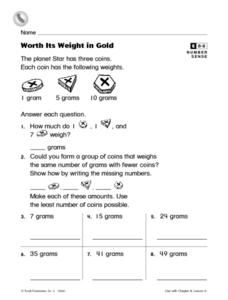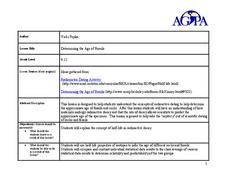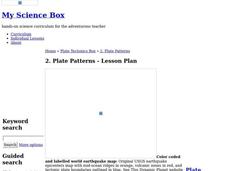Curated OER
Nine in the Sky
First graders explore the day and night sky and complete a page for the number 9 for their counting book.
Curated OER
Phases of the Moon
Students research and identify the phases of the moon. They consider the moon's rotation, as well as that of the earth and sun. They write a description of their research and present it to the class.
Curated OER
Building A Topographic Model
Pupils visualize, in three dimensions, features represented by contour lines on a topographic map. They see that the different elevations shown on a two dimensional topographic map can be used to build a 3-D model.
Curated OER
Volcanoes:How Safe Are They?
Students explore volcanoes, locate them on maps, record general information about volcanoes, and organize information on a fact sheet.
Curated OER
Necessary Nitrogen
High schoolers view a video that presents the biogeochemical cycle of nitrogen. They compare types of soils and consider how different fertilizers affect soil composition.
Curated OER
Science: Total Recall
Third graders attempt to recall details about a person entering the classroom while they are involved in another activity. They test their skills of observation and memories by playing an interactive memory game.
Curated OER
Where Am I?
Students apply map reading skills by locating places through the use of latitude and longitude.
Curated OER
What is Culture?
Learners explore the concept of culture. They discuss the Washoe culture, create a word web, develop a family tree of their own family for a class book, and complete a writing assignment.
University of Rhode Island
The Interactive Boston Computer Museum Tour
Fifth graders use the Internet to use an interactive program which helps them explain the Internet better. They take a tour of a computer museum and focus on how the Internet works through an exhibit.
Curated OER
Biomes: Extreme Climate
Students create a web connecting global warming, the Arctic, and wold climate. They write a paragraph explaining the role of the Arctic in world climate.
Curated OER
Population Needs vs. Population Deeds
Students examine the recent population explosion of the world. After watching a demonstration on closed systems, they identify the role humans have on the depletion of natural resources and lowering the standard of living. To end the...
Curated OER
Embrace Space
Young scholars use the internet to gather informatino about the solar system and space. In groups, they create a slideshow in which they use illustrations from the internet and include their own text. They complete the lesson plan by...
Curated OER
What's the most important issue?
Students identify and compare/contrast a variety of key issues in the UK to issues in their own lives right now. They list the major issues in front of the UK people then and now. In addition, they argue the pros and cons to important...
Curated OER
How Do You Dew?
Students examine how the processes of condensation and evaporation occur. They describe the relationship between heat energy, evaporation and condensation of water on Earth. They give examples of the processes of evaporation and...
Curated OER
The Water Cycle: A Repeating Pattern in Nature
Students are introduced to the terms related to the water cycle in their native language. In groups, they describe the steps of the cycle using different materials found in their art classroom. They describe how energy helps water...
Curated OER
Adaptations
Students identify what adaptation is and to research a specific mollusk. They also identify and interpret how animals get their common and scientific name and why it is Latin. Finally, students draw their shell (mollusk) and name their...
Curated OER
Worksheet 12
In this math worksheet, students explain the vector parametric equation for a line, scalar parametric equations, symmetric equations, and the implicit equation for a line.
Curated OER
Worth Its Weight in Gold
In this comparing weights worksheet, 2nd graders compare and contrast the weight of three different coins and then calculate the answers to eight questions.
Curated OER
Determining the Age of Fossils
Students examine the concept of radioactive dating. In this radioactive dating lesson, students investigate how to determine the ages of fossils and rocks as they learn about half-life radioactive decay.
Curated OER
The North and South Magnetic Poles
In this north and south magnetic poles instructional activity, students read about the presence of auroras over the earth's magnetic poles as opposed to the geographic poles. Students use 2 photographs taken by the IMAGE FUV and the...
Curated OER
Making Good Decisions
Students discuss consequences and trade-offs to different scenarios. In this investigative lesson students learn about compromise and discuss possible options and consequences to certain situations.
Curated OER
Extreme Climate
Middle schoolers discuss global warming, greenhouse effect, permafrost and other key words. In this climate lesson students create a web that connects global warming, the Arctic and world climate then write a paragraph explaining the...
Curated OER
Vocabulary Match: Grade 2
In this vocabulary matching worksheet, students match vocabulary words with definitions, 16 words possible. Worksheet contains links to additional activities.
Curated OER
Plate Patterns
Students review the patterns they discovered from a previous activity. In this investigative lesson students plot data as a class and color a map.



